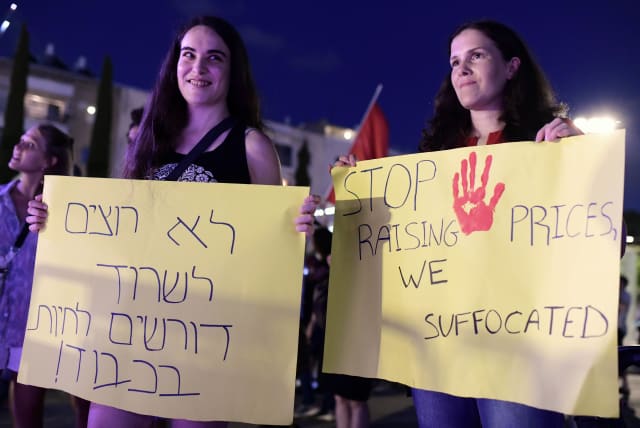High cost of living is the issue that most concerns Israelis - survey

60% of Israelis polled blame the government for egregious living costs. Also of concern to respondents were judicial system reforms and national security.
A survey published Tuesday by the Center for Governance and the Economy at the Israel Democracy Institute (IDI) found that the issue that most concerns the Israeli public is the high cost of living, cited by 31% of respondents as the problem that worries them most. Furthermore, the majority of Israelis polled blamed the government for egregious living costs.
The poll was conducted between April 27 and May 1 using a sample of the Israeli adult population comprised of 761 men and women aged 18 and above. It sheds light on opinions about significant issues on the public agenda, with an emphasis on the economic issues that concern the Israeli public.
According to 60% of respondents, the government is mainly responsible for the high cost of living, particularly increased food prices. Seventy-five percent of those polled said they have been forced in the last year to go without some type of expenditure.
The results were published as the Bank of Israel raised its benchmark interest rate by 0.25% to a total of 4.75% on Monday in an effort to curb rising inflation. This is its tenth consecutive hike in just over a year.
About two-thirds of those polled stated that Israel’s economic situation has become worse or significantly worse since the last year, and around half reported that their personal financial situation had worsened. The study noted that younger people were more worried about the high cost of living than older respondents.
What else is worrying Israelis?
Israelis are losing sleep over other issues, too.
The poll found nearly 37% of respondents cited the consequences of the judicial reforms as the most worrying national issue today. Participants said they worry the reforms will lead to tensions between groups in society, the future of Israel as a democratic state, and the independence of the judicial system.
Residents of southern Israel cited personal security as a key issue of equal importance to the issue of high cost of living.
Daphna Aviram-Nitzan, director of the Center for Governance and the Economy at the IDI, who conducted the survey along with Nadav Porat Hirsh, said the Israeli public is overall dissatisfied.
"The survey finds that the public distinguishes clearly between the responsibility of companies in the private sector and that of the government, and explicitly states that the government bears [more] responsibility," Aviram-Nitzan said.
"Moreover, it appears that the public is dissatisfied with how the government has handled this issue [of living costs], which is not adequately addressed in the state budget, and gives the government a poor grade for its functioning regarding the cost of living and housing costs.
"In addition, the public voiced its fears about the consequences of the reforms to the judicial system, in particular citing concerns about the tensions between different groups in Israeli society, about the future of Israel as a democratic state, and about the independence of the judicial system. In this context, the public once again points the finger of blame at the government, giving it an extremely low grade for its functioning with regard both to Israel’s financial resilience and reducing social inequalities.”
Jerusalem Post Store
`; document.getElementById("linkPremium").innerHTML = cont; var divWithLink = document.getElementById("premium-link"); if (divWithLink !== null && divWithLink !== 'undefined') { divWithLink.style.border = "solid 1px #cb0f3e"; divWithLink.style.textAlign = "center"; divWithLink.style.marginBottom = "15px"; divWithLink.style.marginTop = "15px"; divWithLink.style.width = "100%"; divWithLink.style.backgroundColor = "#122952"; divWithLink.style.color = "#ffffff"; divWithLink.style.lineHeight = "1.5"; } } (function (v, i) { });

